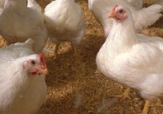
Tyson Slaughters 15,000 Hens after Avian Flu Outbreak in Arkansas
Tyson Foods Inc. of Springdale, Ark., the world's largest meat producer, is slaughtering and burying a flock of 15,000 breeder hens after they were found to be exposed to a low pathogenic strain of avian influenza. Preliminary tests on the flock indicated the presence of the avian influenza antibodies but found no indications of birds with the avian influenza virus. The flock involved has shown no signs of illness and the situation does not possess risk or harm to human health, Tyson said in a news release Tuesday.
The affected hens were housed at a contract poultry producers' farm in northwest Arkansas. The discovery of the antibodies came as a result of a routine, pre-slaughter surveillance conducted by Tyson. On its Web site, the company says it is currently conducting about 15,000 avian flu tests per week, which is five times the number it was conducting a year ago. Tyson is working with the U.S. Department of Agriculture and the Arkansas Livestock & Poultry Commission to take precautionary measures to ensure the flock does not enter the human food chain.
Jon Fitch, director of the state's Livestock and Poultry Commission, said routine blood tests conducted Friday found the possible exposure. Further tests done by the state and USDA found the birds did not have active infections, but rather were exposed to a subtype of the disease. Fitch said state officials decided against announcing the infection to the general public because the birds tested positive for exposure to the H7N3 strain of the virus--not the H5N1 strain that affected Asian poultry stocks in late 2003, killing 240 people worldwide.
In a statement, Tyson spokesman Gary Mickelson said the company, "[a]s a preventive measure," is stepping up its surveillance of avian influenza in the area. "The company plans to test all breeder farms that serve the local Tyson poultry complex, as well as any farms within a 10-mile radius of the affected farm," he said.
On a special "Avian Influenza Information" page at its Web site (http://www.tyson.com/Corporate/PressRoom/AvianInfluenza.aspx), Tyson offers facts about the different types of "bird flu" or avian influenza and notes that the disease cannot be transmitted via cooked chicken. Still, stock in the company fell by 8 percent in trading Tuesday, down $1.47 to $16.98 per share.